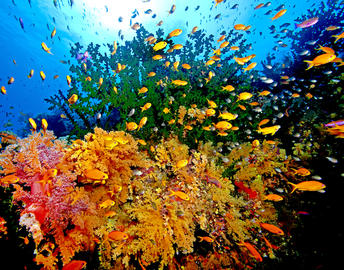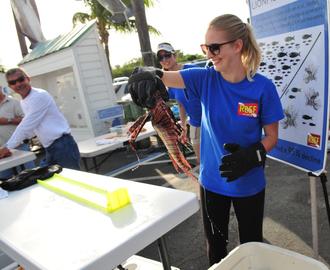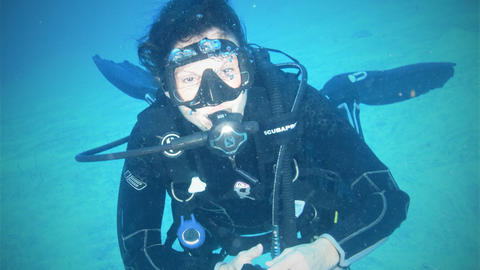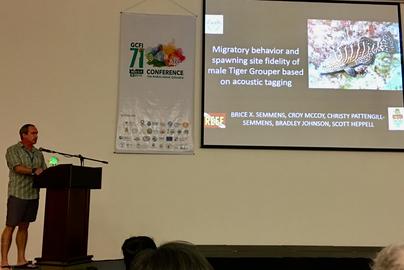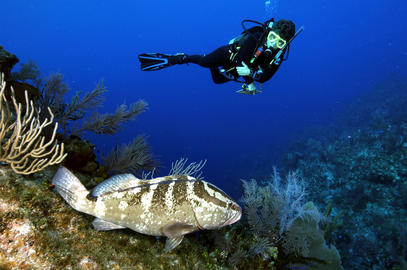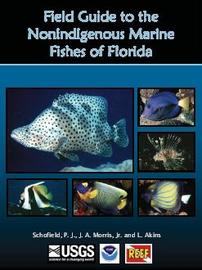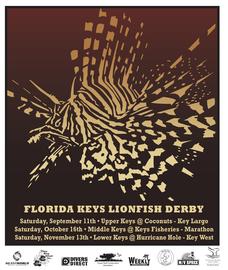I want to thank everyone who donated during our winter fundraising campaign. With member support, REEF was able to raise $115,000. Your contributions drive REEF programs, from protecting keystone species to educating the next generation of ocean enthusiasts. If you haven't donated yet, there are still a few limited-edition prints left for donations of $250 and over that are received by April 4th. You can donate online or call us at 305-852-0030.
Summer is just around the corner and that means the annual REEF Lionfish Derby Series is almost here! Whether you just want to watch the festivities and taste some delicious lionfish bites, or you want to join the derby and compete with other lionfish hunters for over $3,500 in cash prizes, we have something fun for you. This year, REEF will be hosting four lionfish derbies throughout Florida: Sarasota, Fort Lauderdale, Key Largo, and Juno Beach. REEF Derbies are hugely popular events that remove hundreds to thousands of invasive lionfish from local reefs over a single weekend.
Rosette Davila cares deeply about the health of the oceans. As a supporter of REEF programs both in the water and on land, Rosette wants to make a difference. That's why she recently became part of REEF's Legacy Society through a life estate gift. When asked why she chose REEF, Rosette described a long history of diving (since 1993), where she has become increasingly alarmed with the deterioration of our oceans. In 2015 Rosette joined REEF's Lad Akins and Peter Hughes on a REEF Invasive Lionfish Research Trip to The Bahamas.
Lionfish derbies and tournaments were first implemented in 2009 with the intent of increasing public awareness about the lionfish invasion in the western Atlantic, gathering specimens for research, and training volunteers to safely and effectively collect the venomous species. Since then, REEF has coordinated a series of derbies each year and assisted other organizations and groups in organizing and running their own derbies, resulting in the removal of tens of thousands of invasive lionfish.
REEF staff, board members, and project collaborators recently joined over 300 scientists, resource managers, and fishers at the Gulf and Caribbean Fisheries Institute (GCFI) meeting in San Andres, Colombia. GCFI aims to apply fisheries and marine science to solve problems by bringing multiple users of ocean resources together to make informed and coordinated decisions for sustainable use of these resources. REEF staff regularly attend GCFI to share findings and perspectives from our various programs. This year, REEF's Director of Science, Dr.
Predation by the invasive Indo-Pacific lionfish impacts native fish populations within the Caribbean region and threatens to expand further into Brazil and the Mediterranean. Identifying the range-restricted native fish species with high predation vulnerability in these areas ahead of the invasion front combined with the knowledge of the time a lionfish population typically takes to reach dangerously high densities could help conservation planners attain positive outcomes and reduce biodiversity loss.
REEF Director of Science, Dr. Christy Pattengill-Semmens, and Grouper Moon Scientists, Dr. Brice Semmens (NOAA) and Dr. Scott Heppell (Oregon State University), participated in the Gulf and Caribbean Fisheries Institute (GCFI) meeting last month in Guadeloupe. This annual meeting brings together scientists, fishermen, resource agency managers, and marine conservation organizations to present and discuss current topics and emerging findings on coral reef resources of the tropical western Atlantic waters.
Working in close partnership, REEF, NOAA, and the USGS, have just completed the first field guide to non-native fishes in Florida. The 120 page publication documents the occurrences, identification and ecology of more than 35 non-native fish species found in Florida waters. Detailed sightings maps, notes on similar appearing species and information on native ranges are included. The goal of the publication is to provide a single source, field ready guide for enforcement as well as a reference for researchers and educators to aid in early detection and removal of non-native marine fish.
Reef Environmental Education Foundation (REEF) with help from the Florida Keys National Marine Sanctuary (FKNMS) will host an inaugural series of lionfish derbies in the Keys starting this weekend. Divers who remove lionfish from Sanctuary waters will be eligible for more than $10,000 in cash and prizes. Awards will go to the top 3 teams in the following categories: most lionfish, biggest lionfish, and smallest lionfish.

